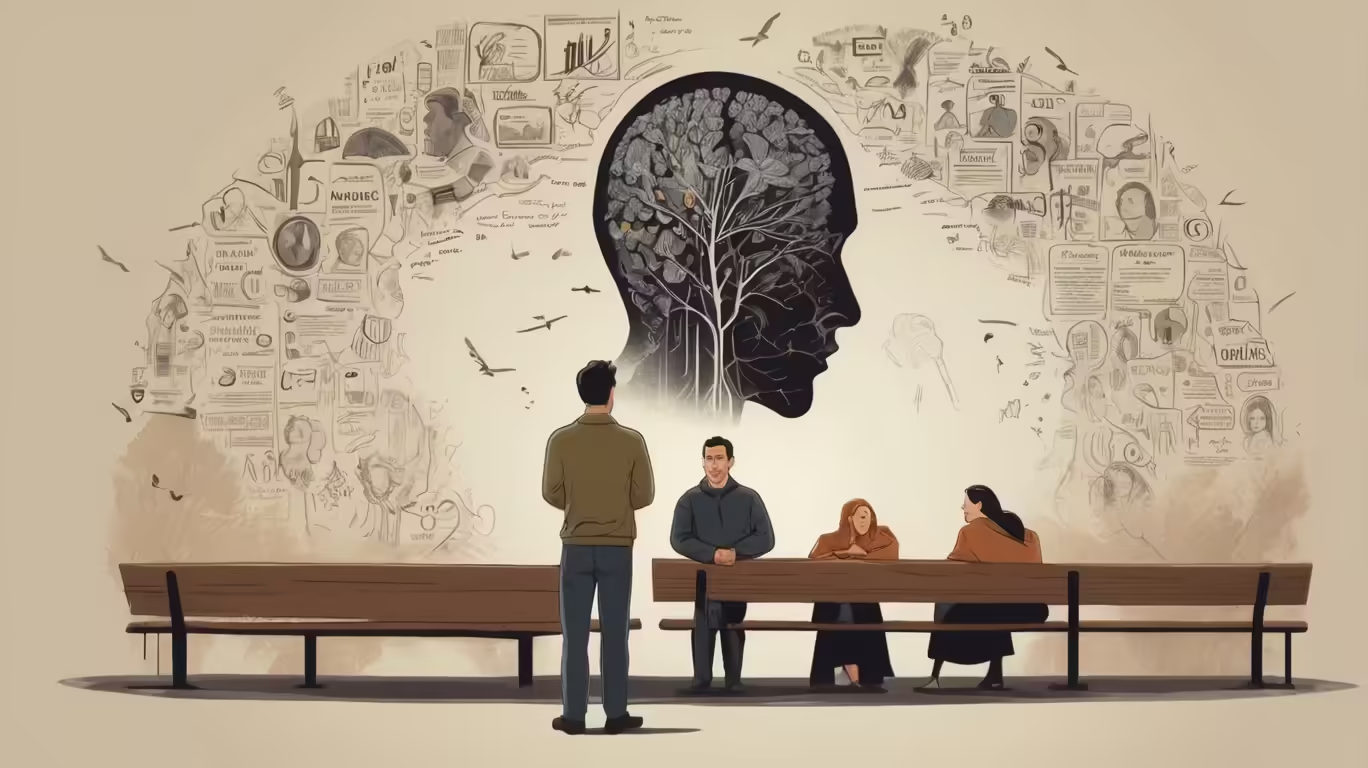
In today’s rapidly evolving world, mental health has emerged as a crucial component of our overall well-being. As we navigate the complexities of modern life, we are constantly bombarded with various stressors—ranging from technological advancements and social media pressures to economic uncertainties and the ever-present need to maintain a work-life balance. These factors collectively contribute to a unique set of challenges that can significantly impact our mental health.
Despite the increased awareness and open discussions surrounding mental health, many individuals still struggle with understanding and addressing their mental well-being. The digital age, while offering numerous benefits, also brings about unprecedented challenges that were not present in previous generations. The pressure to be constantly connected, productive, and socially engaged can lead to feelings of anxiety, depression, and isolation.
This blog aims to explore the multifaceted nature of mental health in the modern world, examining the key challenges we face and offering practical solutions to improve mental well-being. By understanding these challenges and implementing effective strategies, we can foster a healthier, more balanced approach to life. Whether you are personally affected by mental health issues or seeking to support others, this comprehensive guide will provide valuable insights and actionable steps to enhance mental health in today’s fast-paced society.
Understanding Mental Health
Mental health is more than the absence of mental disorders. It is about having a sense of purpose, being able to manage stress, maintaining meaningful relationships, and leading a productive life. Good mental health is a state of well-being where individuals realize their abilities, can cope with normal life stresses, work productively, and contribute to their community.
Mental health disorders, such as anxiety, depression, bipolar disorder, and schizophrenia, can significantly disrupt a person’s life. They can affect anyone regardless of age, gender, race, or socioeconomic status. Recognizing the signs and symptoms of mental health issues is the first step towards seeking help and improving one’s mental health.
Major Challenges to Mental Health in the Modern World
Technology and Social Media
- The Double-Edged Sword of Technology: While technology has brought numerous benefits, such as improved communication, access to information, and convenience, it also has its downsides. The constant connectivity and the pressure to maintain an idealized online persona can be overwhelming. Social media platforms, in particular, can create a sense of inadequacy as individuals compare their lives to the seemingly perfect lives of others. This can lead to feelings of low self-esteem, anxiety, and depression.
- Impact on Sleep and Mental Health: The blue light emitted by screens can disrupt sleep patterns, leading to insomnia and other sleep disorders. Lack of sleep is closely linked to various mental health issues, including depression and anxiety. The compulsive need to check notifications and stay updated can also lead to addictive behaviors and increased stress levels.
Work-Life Balance
- Blurring Boundaries: The rise of remote work has further blurred the boundaries between work and personal life. While it offers flexibility, it also means that employees are often expected to be available around the clock. This constant availability can lead to burnout, increased stress, and a lack of time for relaxation and personal interests.
- Pressure to Perform: The competitive nature of the modern workplace, coupled with economic uncertainties, puts immense pressure on individuals to perform. This can result in chronic stress, anxiety, and feelings of inadequacy. The fear of job loss and financial instability adds to the mental burden.
Economic Pressures
- Financial Stress: Economic pressures, such as unemployment, job insecurity, and the high cost of living, are significant stressors. Financial instability can lead to chronic stress, anxiety, and even depression. The struggle to meet financial obligations can create a constant state of worry and helplessness.
- Socioeconomic Inequalities: Socioeconomic inequalities exacerbate mental health issues. Individuals from lower socioeconomic backgrounds often have limited access to mental health resources and face additional stressors related to poverty, such as housing instability and lack of access to quality education and healthcare.
Social Isolation
- Paradox of Connectivity: Despite being more connected than ever through digital platforms, many people experience social isolation. Superficial online interactions often replace deep, meaningful connections, leading to feelings of loneliness and isolation. This paradox can severely impact mental health, contributing to depression and anxiety.
- Impact of the Pandemic: The COVID-19 pandemic has further heightened feelings of social isolation. Lockdowns, social distancing measures, and the disruption of normal routines have limited opportunities for in-person interactions, exacerbating loneliness and mental health issues.
Overload of Information
- Information Overload: The 24/7 news cycle and the abundance of information available online can be overwhelming. Constant exposure to negative news, such as natural disasters, political unrest, and other global issues, can create a sense of helplessness and anxiety. The need to stay constantly informed can lead to information overload and mental fatigue.
- Misinformation and Its Impact: The spread of misinformation, particularly on social media, can cause confusion, fear, and anxiety. False information about health, safety, and other critical issues can lead to unnecessary panic and stress.
Physical Health and Lifestyle Factors
- Sedentary Lifestyle: Modern lifestyles often involve long hours of sitting, whether at a desk or in front of a screen. Physical inactivity is linked to various mental health issues, including depression and anxiety. A sedentary lifestyle can also lead to physical health problems, which in turn can affect mental well-being.
- Poor Diet and Mental Health: Diet plays a crucial role in mental health. Poor nutrition, characterized by high consumption of processed foods and low intake of essential nutrients, can negatively impact mood and cognitive function. A diet lacking in essential vitamins and minerals can contribute to mental health disorders.
Solutions for Improving Mental Health
Digital Detox
- Setting Boundaries: Taking regular breaks from technology can significantly improve mental health. Setting boundaries for screen time, turning off non-essential notifications, and designating tech-free times can help reduce the mental strain caused by constant connectivity.
- Engaging in Offline Activities: Engaging in activities that do not involve screens, such as reading a book, spending time outdoors, or practicing a hobby, can provide a much-needed break from digital devices. These activities can help reduce stress and improve overall well-being.
Prioritize Self-Care
- Incorporating Self-Care Routines: Self-care is essential for maintaining good mental health. This can include activities such as exercise, meditation, hobbies, and spending time in nature. Self-care routines help reduce stress, improve mood, and enhance overall well-being.
- Practicing Mindfulness: Mindfulness practices, such as meditation and deep breathing exercises, can help manage stress and anxiety. Mindfulness involves paying attention to the present moment and accepting it without judgment. This practice can improve focus, reduce negative thinking, and promote emotional regulation.
Foster Real-Life Connections
- Building Meaningful Relationships: Making an effort to build and maintain meaningful relationships is crucial for mental health. Engaging in face-to-face interactions, joining clubs or groups with similar interests, and spending quality time with loved ones can combat feelings of loneliness and isolation.
- Community Engagement: Getting involved in community activities, volunteering, or participating in group events can help build a sense of belonging and purpose. Community engagement provides opportunities for social interaction and support.
Seek Professional Help
- Therapy and Counseling: There is no shame in seeking help from mental health professionals. Therapists, counselors, and support groups can provide valuable assistance and coping strategies. Early intervention can prevent mental health issues from escalating. Therapy can offer a safe space to explore thoughts and feelings and develop effective coping mechanisms.
- Medication and Treatment: In some cases, medication may be necessary to manage mental health conditions. Consulting with a healthcare provider can help determine the best course of treatment. It is essential to follow prescribed treatment plans and communicate any concerns with healthcare professionals.
Mindfulness and Stress Management
- Stress Management Techniques: Practicing stress management techniques can help manage anxiety and stress. Techniques such as deep breathing exercises, progressive muscle relaxation, and mindfulness meditation can be effective in calming the mind and improving focus.
- Mindfulness-Based Stress Reduction (MBSR): MBSR is a structured program that teaches mindfulness meditation and stress management techniques. It has been shown to reduce stress, improve mood, and enhance overall well-being. Participating in an MBSR program can provide practical tools for managing stress and promoting mental health.
Financial Planning
- Taking Control of Finances: Taking control of finances can reduce economic stress. Creating a budget, setting financial goals, and seeking advice from financial planners can help manage economic pressures more effectively. Financial stability can provide a sense of security and reduce anxiety related to financial uncertainties.
- Emergency Savings: Building an emergency savings fund can provide a financial safety net in times of unexpected expenses or job loss. Having savings set aside can reduce financial stress and provide peace of mind.
Stay Informed but Limit Exposure
- Balanced News Consumption: Being informed about world events is important, but it is equally important to limit exposure to negative news. Setting specific times to check the news and avoiding sensationalist media can help maintain a balanced perspective. Consuming news from reliable sources can prevent misinformation and reduce anxiety.
- Positive News and Content: Balancing news consumption with positive content can improve mental well-being. Reading uplifting stories, watching inspiring videos, or engaging with positive content can boost mood and provide a sense of hope.
Healthy Lifestyle Choices
- Regular Exercise: Physical activity is closely linked to mental health. Regular exercise can reduce symptoms of depression and anxiety, improve mood, and enhance overall well-being. Engaging in physical activities that you enjoy can make exercise a sustainable and enjoyable part of your routine.
- Balanced Diet: A balanced diet that includes a variety of nutrient-rich foods can support mental health. Consuming fruits, vegetables, whole grains, lean proteins, and healthy fats provides essential nutrients that support brain function and mood regulation. Staying hydrated and limiting the intake of processed foods and sugars can also improve mental well-being.
- Adequate Sleep: Quality sleep is crucial for mental health. Establishing a regular sleep routine, creating a comfortable sleep environment, and practicing good sleep hygiene can improve sleep quality. Avoiding screens before bedtime and limiting caffeine intake can also promote better sleep.
- Avoiding Substance Abuse: Substance abuse can have severe negative effects on mental health. Avoiding the use of drugs and excessive alcohol consumption is essential for maintaining mental well-being. Seeking help for substance abuse issues can provide the support needed for recovery.
Conclusion
Mental health in the modern world presents unique challenges, but with conscious effort and practical strategies, these challenges can be managed effectively. Prioritizing self-care, fostering meaningful connections, seeking professional help when needed, and adopting healthy lifestyle choices are crucial steps toward better mental well-being. By addressing these issues head-on, we can cultivate a healthier, more balanced approach to life in the digital age. Remember, mental health is just as important as physical health, and taking steps to nurture it is essential for a fulfilling life.
Investing in mental health not only improves individual well-being but also strengthens communities and societies. By raising awareness, reducing stigma, and promoting mental health resources, we can create a supportive environment where everyone has the opportunity to thrive.
